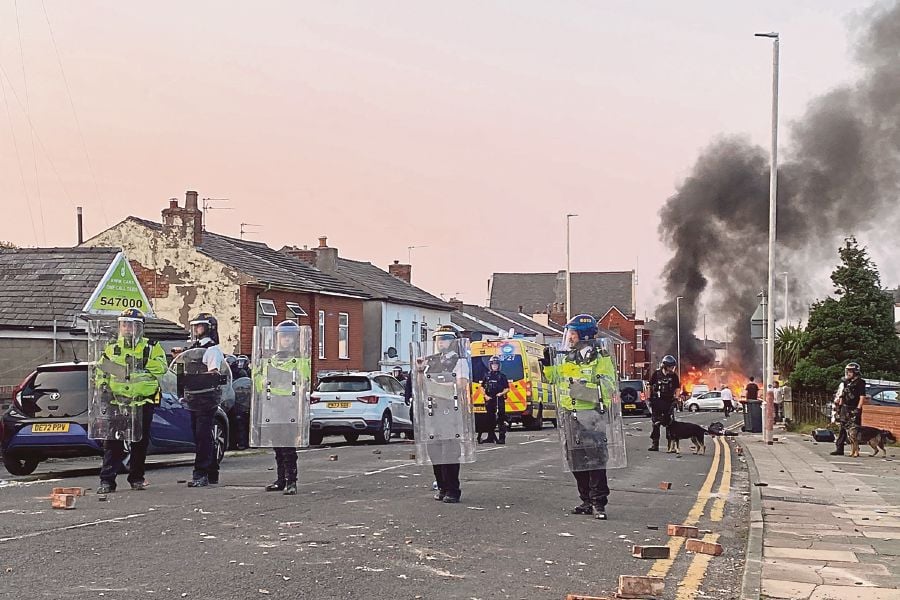
THE United Kingdom has always been a popular destination for travellers, especially from Malaysia, due to its rich history, iconic landmarks and shopping scene.
Many, too, would choose its universities and higher education institutions to further their studies.
But recent ugly incidents in Manchester, Birmingham and Bristol have heightened fear and worries, leading to questions like: "Is it still safe to go to the UK?"
The riots saw defiance of the authorities, looting and fighting, as well as anger directed at anyone who is not white and deemed not belonging to this country. These were thugs and not ordinary protesters.
Most of the thugs, who just needed an excuse to take to the streets and then loot, with the youngest being 12 with a string of criminal records, have been dealt with by the police. Some are already behind bars.
What had happened underlined the fact that we have to be careful and vigilant.
The riots were sparked by an incident at a school in Southport, where a 17-year-old boy stabbed and killed three young girls and injured others, including two adults.
Although the incident was triggered by misinformation, even the emergence of the truth did not quell the unrest, and it went on for several days, causing fear and anxiety, especially among the migrant population.
But there's more to it than anti-immigrant sentiments that had spilt to the streets. Lawlessness, including street crimes, has long prevailed.
Recently, an 11-year-old Australian girl visiting Leicester Square in the capital with her family was put in a headlock by a stranger and stabbed eight times in full view of the public. Most of these incidents, tragically, involved children.
Police records show 50,833 knife-crime offences for the year ending June 2023. Of these, 14,577 crimes occurred in London.
Knife crime usually stems from gang-related activities affecting certain neighbourhoods, in what is termed "postcode war". However, there's always a risk that bystanders could get caught up in the violence.
Tourists should be cautious when visiting unfamiliar areas, especially after dark.
Stick to well-lit, busy streets, avoid wearing expensive jewellery and consider travelling in groups when possible.
Contributing to this rising lawlessness is concerning increase in mental health issues, made worse by economic pressures, social isolation and cuts to mental health services.
Many of those suffering from untreated mental health issues are turning to crime, either out of desperation or due to a lack of support.
This has led to a dangerous mix of instability and unpredictability in public spaces. These are crimes that are blind to race or colour.
A closed-circuit television camera clip recently showed a man walking on the southbound Victoria platform. He was pushed by a stranger into the path of an oncoming tube train at Oxford Circus station for giving him "a dirty look".
Crime in and around tube and train stations, too, have increased. There have always been instances of people crashing through ticket barriers on public transport to dodge fares. And apart from a rap on the knuckles, nothing else is done about it.
If you are waiting to touch your Oyster train card at the barrier, be aware of people standing too close behind you.
No, these are not pickpockets, but they are people who would take advantage of the open barriers to go through without paying.
Guards are hardly around these days to check tickets, as most people use Oyster cards or even their credit or debit cards, or even the e-wallets in their phones. Even if the guards are present, they usually turn a blind eye to these cases. The aggravation and violence are not worth the hassle.
The same goes for shoplifting. It is another worrying trend, as even shopkeepers and store owners are looking the other way while offenders help themselves to goods.
After witnessing one such incident, I told the cashier about it while making my payment, but he dismissed it as "not worth the hassle". After all, they are covered by insurance.
Apprehending a shoplifter may cause aggravation, which could escalate to violence and would affect other customers.
Another troubling trend is pick-pocketing and phone snatching.
Vigilante groups have taken it upon themselves to identify and shame pickpockets operating around tourist areas, such as Buckingham Palace, Tower Hill and Oxford Street, and, of course, around Big Ben in Westminster.
Operating similar to vigilante groups in Milan and Paris, they would follow suspects who usually work in groups, even into public transport, risking being spat at or physically and verbally abused.
TikTok is full of such clips warning the public.
Many Malaysian tourists tend to carry a lot of cash and have found themselves in the unfortunate position of being out of pocket after a trip to these busy areas.
They are unaware that they have fallen victim until they stop to pay for something. The situation is worsened when passports are also lost.
Fast bikes and scooters are accessories for street criminals who snatch phones while people are busy reading their messages or talking on the phone.
So, you must be wondering, what are the police doing?
The police are affected by budget cuts and are stretched thin.
They are struggling to manage the increasing crime rates. They do appear overwhelmed and unable to address everyday offences, such as pickpocketing and fare evasion.
The public has accused the police of turning a blind eye to minor offences.
Recently, residents of a popular tourist destination, Southend on Sea, voiced concerns about the increasing crime rate and called for the police to be armed with guns, like in the United States. Such is the level of worry.
This state of lawlessness reflects deeper societal problems and needs urgent attention. Root causes, such as poverty, social exclusion and the mental health crisis, need to be addressed.
So, tourists and residents should stay vigilant and be informed. It is still possible to have a safe and enjoyable trip in the UK.
